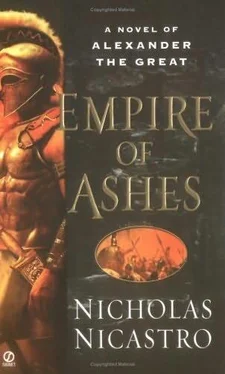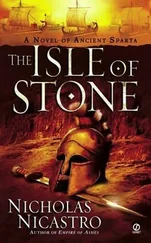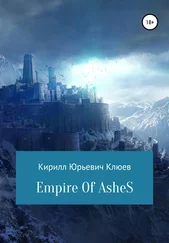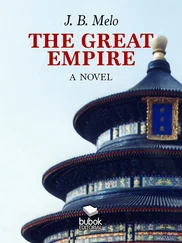Nicholas Nicastro - Empire of Ashes - A Novel of Alexander the Great
Здесь есть возможность читать онлайн «Nicholas Nicastro - Empire of Ashes - A Novel of Alexander the Great» весь текст электронной книги совершенно бесплатно (целиком полную версию без сокращений). В некоторых случаях можно слушать аудио, скачать через торрент в формате fb2 и присутствует краткое содержание. Жанр: Исторические приключения, на английском языке. Описание произведения, (предисловие) а так же отзывы посетителей доступны на портале библиотеки ЛибКат.
- Название:Empire of Ashes: A Novel of Alexander the Great
- Автор:
- Жанр:
- Год:неизвестен
- ISBN:нет данных
- Рейтинг книги:4 / 5. Голосов: 1
-
Избранное:Добавить в избранное
- Отзывы:
-
Ваша оценка:
- 80
- 1
- 2
- 3
- 4
- 5
Empire of Ashes: A Novel of Alexander the Great: краткое содержание, описание и аннотация
Предлагаем к чтению аннотацию, описание, краткое содержание или предисловие (зависит от того, что написал сам автор книги «Empire of Ashes: A Novel of Alexander the Great»). Если вы не нашли необходимую информацию о книге — напишите в комментариях, мы постараемся отыскать её.
Empire of Ashes: A Novel of Alexander the Great — читать онлайн бесплатно полную книгу (весь текст) целиком
Ниже представлен текст книги, разбитый по страницам. Система сохранения места последней прочитанной страницы, позволяет с удобством читать онлайн бесплатно книгу «Empire of Ashes: A Novel of Alexander the Great», без необходимости каждый раз заново искать на чём Вы остановились. Поставьте закладку, и сможете в любой момент перейти на страницу, на которой закончили чтение.
Интервал:
Закладка:
Soon the Macedonians broke through at several points. I went in from the city’s north end, and saw more than I care to relate. The city was overwhelmed so rapidly that the Tyrians did not have time to organize a final defense; after its highly coordinated beginning, the day gave way to an afternoon of chaos as the Macedonians, stymied for months, having lost more men at Tyre than at the Granicus and Issus combined, worked their frustration against the people. The bodies piled up as the Tyrians continued their resistance from their doorways and rooftops and the Macedonians, equally determined, hacked their way into homes, shops, and temples. By sundown, I saw that the pipes bearing sewage from the streets to the sea were gushing red. The waters ran so thick that the seabirds, smeared with human blood, could not fly.
Having given his men their moment of revenge, Alexander commanded that all survivors be spared. The entire royal family was captured alive in the Temple of Heracles, along with a party of Carthaginian emissaries. The Tyrian king, Azemilcus, was released with his retinue, while the Carthaginians were packed off for home, with a message from Alexander that he now considered that city his enemy.
The entire remaining population of Tyre, rich and poor, some thirty thousand souls, were given in chains to their rivals. It was said that the markets of Sidon were so glutted with product that a slave could be purchased for the equivalent of a few dozen drachmas. Even minor farmers could afford to buy themselves a former aristocrat or fashionable lady for whatever purpose they desired. Thus are the wages of resistance to the “Captain of the Greeks.”
Machon allowed this grim imagery to sink into the minds of the jurors. Swallow glanced at the Macedonians in the spectator’s box: there was such a transparency of pride on their hairless faces that he wanted to spit on them.
Before he left the empty streets, Alexander made a victory trophy of a Tyrian ship, mounting it in the sanctuary with the inscription he had written himself. It read “Dedicated to the god by Alexander, son of Philip, from inside the city.” He then did as he first requested seven long months before-he made sacrifice to Heracles at his temple within the walls.
If nothing else, Alexander hoped the siege and its aftermath would lessen future loss of life, as fewer cities would refuse to open their gates to him. Unaccountably, it seemed to have the opposite effect in the next big town he encountered on the way to Egypt. The satrap of the city of Gaza, an Arab named Batis, had watched the reduction of Tyre and took the opposite lesson: that Alexander could be defeated if he was denied the use of his artillery.
Gaza stood on a great hill, ringed by well-built walls, that was surrounded by loose sand too unstable to erect towers or heavy equipment upon. Siege trains bogged down to their axles. The city was situated in such a lofty spot that catapults could not hit the walls at an effective angle from anywhere around it. The defenders were well-supplied, and a besieging force would need to subsist in dry, difficult country. Batis made it more difficult still by burning all the fields in the surrounding area before Alexander arrived. As Gaza was not a port town, and therefore could not supply the Persian fleet, Batis may also have believed his enemy would content himself with a mere show of force.
Suffice it to say he was mistaken. As his campaign advanced, Alexander was even less willing to brook resistance. Nor was he inclined, he informed us, to expend another half a year reducing another recalcitrant city. His staff must find a way into the place in a matter of weeks, not months.
After much discussion, it was agreed that tunneling was the one tactic the soft soil around the city did afford. Accordingly, excavation began from a place out of sight of the Gazans, so Batis would not know what was coming. To further distract the enemy from making an effective defense, Alexander had a ring of siege towers built from large trees dragged all the way from Lebanon. The trunks of these had to be sunk many yards into the ground to give support to his engines. The Gazans took the bait: they commenced raising the tops of their walls to match the works of the enemy. Alexander ordered his men to build higher-Batis also built higher, racing the Macedonians skyward until the extremities of both structures were so tall they could be seen from miles out at sea. It was all a splendid ruse, however, as the real attack was completely out of sight, under everyone’s feet.
So it happened that one day Alexander was out among his engineers, helmetless in the great heat, when fate intervened again. A crow, flying out of the west, passed over him and dropped a heavy object on his head. The King was briefly stunned, and the bird, strangely, did not escape but landed on a siege tower. The object that hit Alexander was an abalone, which was closed when it fell from the bird’s grasp but opened up after it hit the ground. Aristander the soothsayer was summoned to explain this event; making a quick examination of the evidence, he was concerned, saying that the fact that the abalone had opened meant the town would fall, but that Alexander could be killed in the assault if he was careless.
This omen caused some consternation in the Macedonian camp, as the life of Alexander was far more valuable than the submission of Gaza. Alexander would not be deterred, of course, promising only that he would stay away from the front lines.
Fate is not so easily changed. As Alexander was sitting far to the rear, watching unhappily from a distance, a Gazan soldier was presented to him as a deserter. This man was allowed to keep his shield for his interview with the King. Casting himself at Alexander’s feet, he begged permission to join the Macedonian army; the King bid him to stand and be accepted into his service. At that instant the deserter, who was really an agent of Darius, pulled a dagger hidden in his shield and fell on Alexander. The attacker was cut down before he could harm the King, wounding him only lightly in the neck. Without a thought for the danger he had just barely escaped, Alexander directly called for Aristander: as the assassin’s cut must qualify as the wound he had prophesied, could he now return to the front ranks? But Aristander shook his head, for the injury was too minor. Disappointed that the cut was not serious enough, Alexander sank, dejected, back on his throne.
Having seen their tormenter go down earlier that day, the Gazans saw an opportunity. Sallying forth that night, they took the Macedonian sentries by surprise and nearly reached the siege works with their torches. None were surprised when the King forgot his pledge and threw himself into the fight. Suffering great losses, the Gazans retreated, but not before Alexander was wounded in the shoulder by an arrow. Instead of worrying him, this injury filled him with delight: Aristander’s prediction had at last come true, so the town must fall.
With redoubled energy, pushing his men to their limits, Alexander caused the siege works to rise and the mines sink deep into the earth. At last, near the end of the month of Maimakterion, all was ready: at their leader’s signal, the miners removed the supports they had installed in the tunnels, and a wide section of the wall collapsed in a heap. The Macedonians stormed into the breach just as the last stone came down. The rest of the day saw bitter fighting, as the Gazans knew the fate of Tyre, and expected no better. Every one of the ten thousand men in the town was killed in the fight; the women and children went to the Sidon markets, where they sold even more cheaply than the Tyrians.
A single exception was made for Batis himself. Orders went around that the satrap was to be taken alive, and this was accomplished, though he did his best to achieve a soldier’s death. When he was led before Alexander, he looked his conqueror straight in the eye, refusing to bend knee before him. Alexander threw up his hands, saying “What shall I do with this man? With just a word he could save himself, but he stands there mocking me on the field I have duly taken from him.”
Читать дальшеИнтервал:
Закладка:
Похожие книги на «Empire of Ashes: A Novel of Alexander the Great»
Представляем Вашему вниманию похожие книги на «Empire of Ashes: A Novel of Alexander the Great» списком для выбора. Мы отобрали схожую по названию и смыслу литературу в надежде предоставить читателям больше вариантов отыскать новые, интересные, ещё непрочитанные произведения.
Обсуждение, отзывы о книге «Empire of Ashes: A Novel of Alexander the Great» и просто собственные мнения читателей. Оставьте ваши комментарии, напишите, что Вы думаете о произведении, его смысле или главных героях. Укажите что конкретно понравилось, а что нет, и почему Вы так считаете.












